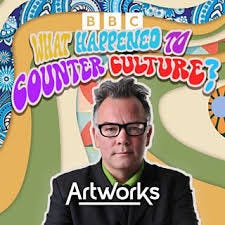Radio review #4: What Happened to Counter-Culture?
Beat beginnings hatch ongoing resistance
IT IS HARDLY unhelpful, for the readers of this website, to report that a new BBC radio series on the history of the transatlantic counterculture begins with Allen Ginsberg reading in a 1950s performance of ‘Howl’ in the US and ends with the same poet speaking with a similar and distinctive tone at 1965’s International Poetry Incarnation at London’s Albert Hall.
What Happened to Counter-Culture? - where it came from, where it’s been and where it’s heading – is a five-part survey of the subject, stretching from the era just after the Second World War, through art and activism, jazz and psychedelia and punk and the rise of early cyberculture, all rolling on into the new millennium and the digital age.
But the initial episode, entitled ‘Absolute Beginners’ – a knowing reference, clearly, to Colin MacInnes’ 1959 novel, a very early fictional attempt to chart London’s teen subcultures mid-century – sets out its stall without reservation: the Beats, the American Beat Generation, are unhesitatingly identified as year zero to this phenomenon, the key catalyst for the gathering and swelling clans of the counterculture which would leave their mark on society over the next seven decades to come.
Pictured above: Stewart Lee and his new Radio Four documentary series
The series, sheltering under a new alternative culture umbrella called Artworks, is presented by comic Stewart Lee, a performer with pronounced left-wing values and an acerbic, if deadpan, temperament. Here the stand-up adopts quite a serious style, only occasionally inserting a fleeting flash of flippancy. Those asides do not rock the boat critically and his general inclination seems to be one of approval towards these ongoing insurrections of the mind and spirit.
The narrator immediately and effectively teases us in: ‘Counterculture: an intoxicating brew of alternative music, independent ideas, of underground presses, writing and art, of activism, what were called happenings, a philosophy of liberation that swept across Western societies in the second half of the twentieth-century. Living outside the mainstream…’
Lee’s commentary is aided and abetted by some wonderful contemporary audio clips plus a gallery of authoritative voices: experimental music maker Brian Eno, present at the Albert Hall event, psychogeographer and novelist Iain Sinclair, often aligned with the Beat movement, Joe Boyd, music producer of high reputation, legendary folk singer Shirley Collins, Jon Savage, respected specialist in the fields of youth and punk, and John Harris, an expert on political rock.
The premiere show, at 30 minutes, never drags, provides a crisp digest of the main themes and threads and briefly trails the topics that will appear in episodes two and three. It touches upon the ideological issues that often underpin the countercultural thrust and handles the material smoothly and adeptly though one of the fact-checking team might have been sharper on the year ‘Howl’ was written. Not 1957, I can advise.
All in all, nonetheless, a fine and user-friendly introduction to the multiple tangles of ideas and actions that have provided a rallying point for those dissatisfied with the grey certainties of the status quo. This series appears sure to confirm that such challenges to the establishment have not gone away…
Editor’s note: What Happened to Counter-Culture? was first broadcast on BBC Radio Four today, Thursday, August 7th, 2025, at 9.30am. The four shows to follow – ‘Revolution in the Head’ and ‘Beauty in the Streets’, ‘Culture Clash’ and ‘Interzone’ – can be heard on subsequent Thursdays. The series is also available on BBC Sounds.



Love to hear it if I can find it. Just read Absolute Beginners for the first time. Very cool book and author. Definitely Beat. Didn’t get to London until 1973 when mod/ music era ending. Too old for Punk was I.
Sounds like an excellent series. By the way, there was a highly stylized, well-executed film of Absolute Beginners directed by Julian Temple. It's a good visual leap into the era and sharply distinguishes in visual and sonic terms British subculture of the late 50's and early 60s from American counter culture. Worth a look for folks who can find it.